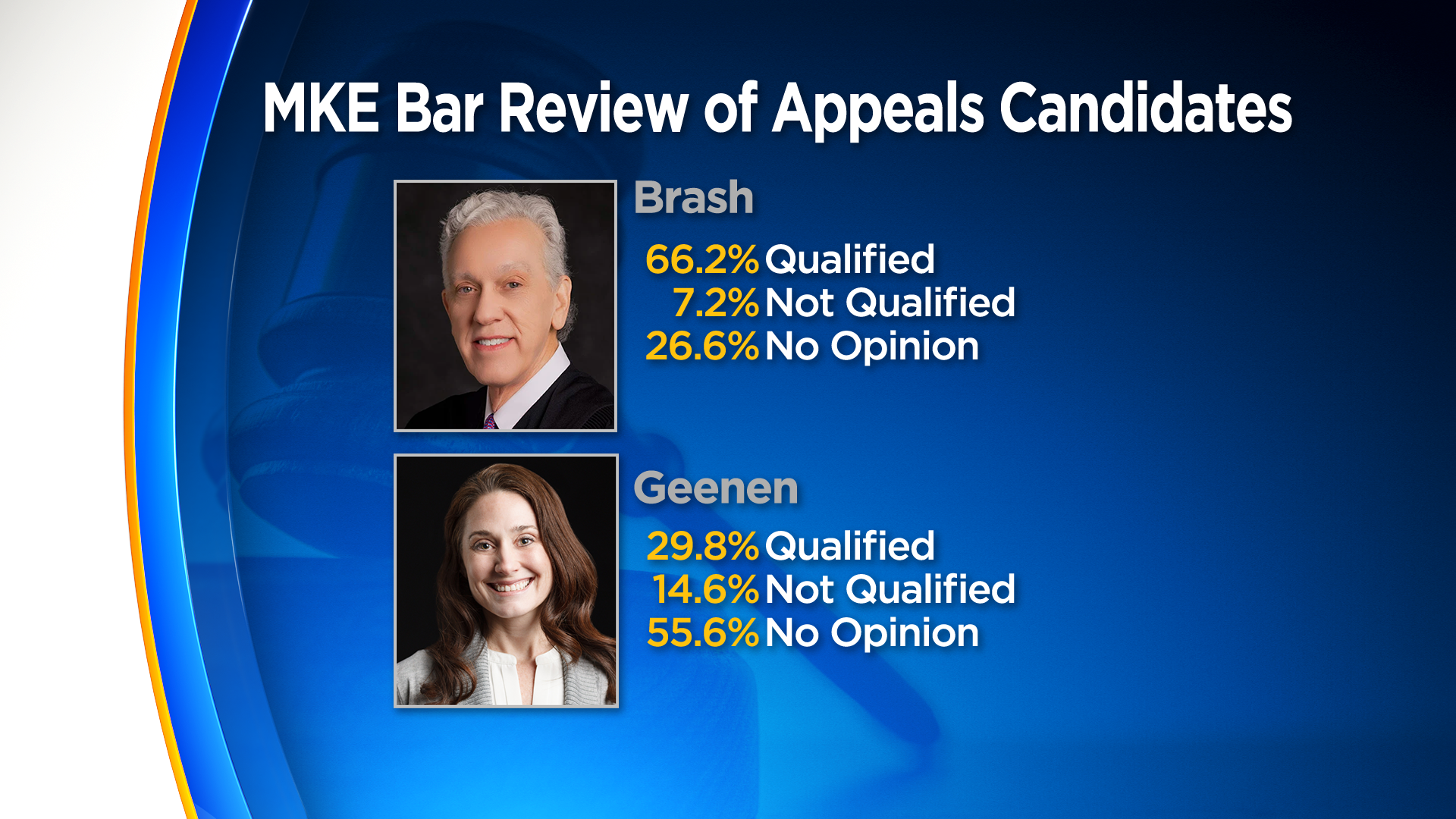Besides the Supreme Court, there's another high-stakes election for judge -- why it matters for Milwaukee County voters
MILWAUKEE (CBS 58) -- While Wisconsin's race for control of the state Supreme Court is undeniably the most impactful race on the ballot for next Tuesday's Spring Election, there's another vital contest that will affect hundreds of future cases.
In a small courtroom inside the downtown 330 Kilbourn office complex, a panel of four judges reviews challenges to rulings in criminal cases and lawsuits. The vast majority of rulings issued by Wisconsin's Court of Appeals will stand as the Supreme Court accepts only a portion of the appeals decisions challenged to the state's highest court.
The appellate court in Wisconsin is broken up into four districts:
- The fourth district, based in Madison, covers the southwest part of the state
- The third district, based in Wausau, covers Northern Wisconsin
- The second district, based in Waukesha, covers most of Southeast Wisconsin
- The first district, based in Milwaukee, handles all Milwaukee County cases.
The first district is also home to Wisconsin's chief appellate judge, Bill Brash. He was appointed to the Court of Appeals by Republican former Gov. Scott Walker in 2015. Running unopposed, Brash was then re-elected to the court for a full six-year term in 2017.
His opponent, Sara Geenen, has never been a judge.
"I have established a track record going back now 33 years on a bench," Brash said in an interview.
Brash pointed to his experience as a municipal judge in Fox Point before serving on the Milwaukee County Circuit Court from 2001 to 2015, when he was appointed by Walker to the appellate court.
In an interview, Geenen said she believed the court could use a shake-up. As a lawyer who's represented unions, Geenen maintained she'd provide a valuable perspective as someone who has advocated for workers.
"I think we've seen corporate interests creep into our legislature," she said. "And we can't let them creep into our courts. We need to make sure that people continue to be able to have a voice, to have that say."
Brash said he believes his experience is a significant advantage in the race. He noted he's rotated through felony and homicide courts at the circuit level, handling a variety of cases, ranging from homicides at the circuit level, to business and land disputes in the court of appeals.
"I think those put me in a much better position," he said. "Because I have a greater depth of understanding than she has in this juncture in her life."
The gap in experience is reflected in a poll of the Milwaukee Bar Association. Two-thirds of its members said they consider Brash to be qualified for the position while most of the respondents said they didn't know enough about Geenen to have an opinion.
Geenen said her lack of experience handling cases shouldn't sway voters.
"Just being a judge isn't the only qualification," she said. "[As] lawyers, our job is to take look at the cases, take a look at what the law requires, take a look at the legislative history, and determine whether or not the decision was right."
Judicial views, accusations of political influence
The campaign between Brash and Geenen has had its share of political rhetoric. As a CBS 58 crew followed Geenen while she knocked on doors near the UW-Milwaukee campus Wednesday, Geenen repeatedly noted Brash was appointed by Walker.
She appeared to contrast her background to Walker's key role in signing the 2011 Act 10 legislation that largely stripped public workers of their collective bargaining rights.
"I represent regular workers on a daily basis," Geenen said. "And during the course of that, I started seeing regular people having their rights taken away."
Brash said he believed Geenen's emphasis on labor rights called into question her ability to impartially handle such cases as a judge.
"If she were to get elected and take oath, she'd pledging that it kind of stops there," he said. "That it won't have any impact on her ultimate decision-making process."
Brash also noted Geenen's financial backing from the state Democratic Party. Campaign finance records show Geenen received $10,000 this month from the Democratic Party of Wisconsin; unions and labor groups contributed another $20,000.
Brash's campaign finance filings show he did not accept donations from committees, but did take $6,000 from Elizabeth Uihlein, who's one of the country's most prolific backers of Republican candidates.
"Am I a conservative? I think it's a fair assessment that I'm a judicial conservative," Brash said.
Brash said he doesn't hide his judicial philosophy but maintained his definition of judicial conservatism meant strictly following what existing law said when considering a case.
A CBS 58 reporter asked Geenen if she would recuse herself from any case involving a union she'd represented in the past.
"I think I probably would," she said. "The question is a little broad, so I'm just- would I recuse myself from someone where I've had financial gain in a campaign? Yes, absolutely."
The buck (mostly) stops here
Records from the state court system illustrate the significance of the appellate court in settling cases. According to the Wisconsin Supreme Court's annual term report, the high court considered 544 appellate court rulings that had been challenged during the 2019-20 term. Of those cases, the Supreme Court decided to hear only 45 of those cases.
During the 2020-21 term, the court considered 596 appellate rulings, and granted just 52 of them for review.















